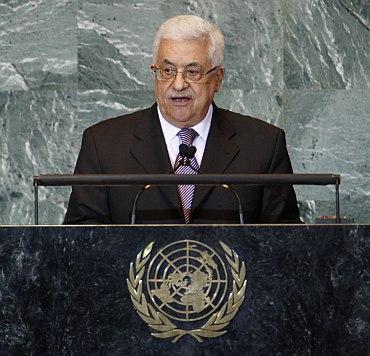Photographs: Mike Segar/Reuters Betwa Sharma in New York
Defying the United States, Palestinian President Mahmoud Abbas formally requested that the United Nations recognise the Palestinian state.
This move is seen as the rolling of a new dice in the Palestinian-Israel conflict, and it could also weaken the United States monopoly over the stagnant peace process.
In the backdrop of ...
'America's commitment to Israel's security is unshakeable'
Image: US President Barack ObamaPhotographs: Jim Young/Reuters
But the Palestinians, deeply frustrated at the slow pace of the talks, have refused to negotiate until Israel stops building settlements on occupied territory.
"The core of the conflict is not the settlement, the settlements are a result of the conflict," Netanyahu countered in his speech. "The core of the conflict is the refusal of the Palestinians to recognise a Jewish state in any border."
Both parties need to work out a two-state solution on the basis of the 1967 borders as well as resolving disagreements on refugees and Jerusalem. Infighting among the Palestinian leadership has also slowed the process.
Obama, whose efforts to broker peace appear feeble, is boxed in by domestic politics. As he gets ready to run for another term, the US leader needs the backing of the strong pro-Israel lobby in the US.
"America's commitment to Israel's security is unshakeable, and our friendship with Israel is deep and enduring," he said, at the UN "And so we believe that any lasting peace must acknowledge the very real security concerns that Israel faces every single day."
Obama's speech at the General Assembly was viewed by many as having a pro-Israel bias. For many observers, the US no longer appears to be as neutral broker for peace and the idea of Washington solely handling the peace process does not seem pragmatic.
In his speech, French President Nicolas Sarkozy suggested that a one-year deadline should be set for resolving the crisis, and more Arab and European parties should be involved in seeking a solution.
"In 60 years, we have not moved forward by even one centimeter.... doesn't that oblige us to change methods and timetables?" he told the General Assembly, this week. "A collective approach has become essential to creating trust and providing real guarantees to each of the parties."
...
Give Palestinians 'observer status' like the Vatican: Sarkozy
Image: French President Nicolas SarkozyPhotographs: Philippe Wojazer/Reuters
It is not clear how long the Security Council will take to process the Palestinian application. Martin Nesirky, Ban's spokesperson, told journalists that the procedural requirements for handing over the application to the Council would be done "quickly."
The application is expected to be studied by the Security Council, next week. The US will attempt to convince other nations in the 15-member Council to vote against the resolution as well.
India, which is a non-permanent member on the Council, has indicated that New Delhi is for the Palestinian cause. If the US emerges as the sole detractor, it will further tarnish its image in the Middle East where already anti-US and anti-Israeli sentiments are running high.
If the US blocks the application in the Security Council, the Palestinians then have the option of directly approaching the 194-member General Assembly for recognition.
The Palestinian question has loomed large over the opening week of the General Assembly, this year. It has caused divisions between the US and its European allies like the United Kingdom and France, who are pushing for a middle path to avoid direct confrontation.
In his speech, for instance, Sarkozy suggested giving Palestinians "observer status" similar to the Vatican. "That's a completely new thing; it's a very important step toward the full recognition of a State in its own right which would be achieved through the negotiation that we're calling for," Alain Juppe, the French foreign minister told Al Jazeera, in an interview.
"There is a lot of areas where we think we can work with the French, even as we have a different view on the UN," Ben Rhodes, deputy National Security Advisor For Strategic Communications, told journalists after Sarkozy spoke at the UN.
But France also stopped short of supporting the Palestinian bid for full-membership, which leaves Palestinians wondering whether they will muster enough votes, if it comes down to a vote in the General Assembly.
An elevation from "entity" to "observer state" would carry some advantages for the Palestinians, who could, for instance, become signatories to treaties that will enable them to take their grievances to bodies like the International Criminal Court.
The Palestinian move also comes during the revolution, which has gripped the Middle East. As people are speaking up for their rights, the Palestinians do not want to get left behind. Abbas declared that the time of the "Palestinian spring" had come.




article